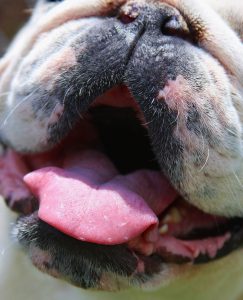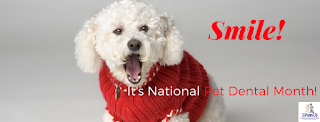Your Pet’s Bad Breath
Nothing says “I love you” quite like a wet, sloppy kiss from your canine companion, or an up-close and personal “meow” from your feline friend. But what can you do if that kiss or meow is accompanied by some seriously bad breath? If your pet suffers from stinky breath, it could indicate a health problem that needs attention, or it could be a bi-product of a poor diet.
Periodontal disease is by far the most common cause of bad breath in pets. Plaque buildup can cause gingivitis which, if left untreated, can turn into periodontal disease. This disease can be quite serious, causing pets to lose teeth, develop gum disease, and can even cause kidney and heart damage. When it comes to your precious pet’s teeth and gums, the old Ben Franklin idiom, ‘An ounce of prevention is worth a pound of cure’ certainly applies. Brush your pet’s teeth regularly, perform routine mouth inspections (feel around for loose teeth, unusual bumps, etc.), and arrange for regular oral exams by your pet’s veterinarian.
Kidney and liver disease can negatively affect a pet’s breath. Odor producing bacteria in your pet’s stomach, lungs, and/or mouth can build-up and produce a bad smell. A persistent odor is a good indication something is wrong in the gastrointestinal tract, kidneys or liver, and should be checked out by your vet.
Diabetes can produce a fruity or sweet smelling breath. While the smell may seem ideal, the cause can be quite dangerous for your pet. The main symptoms of diabetes for your pet is excessive thirst and frequent urination. Sometimes, a pet with diabetes may display an insatiable appetite. This disease is more often seen in obese pets, although even ones at a proper weight can develop diabetes.
Feline leukemia and feline immunodeficiency virus are both autoimmune diseases that affect cats. If you notice bad breath in your cat, along with a loss of appetite, pale gums, runny eyes or nose, vomiting, lethargy and weight loss, these are all symptoms of a serious health issue that need your vet’s attention.
A poor diet can also be to blame for your pet’s unpleasant breath. High-quality pet foods aim to support your pet’s digestive and immune systems, aiding in a healthier life and better breath.
Bad breath in pets is not normal. Don’t ignore bad breath; seek veterinarian attention as it’s always easier to treat a medical issue in the early stages, rather than giving the issue, and your dog’s breath, a chance to fester.
See more at- http://www.2pawsupinc.com




Comments
Post a Comment